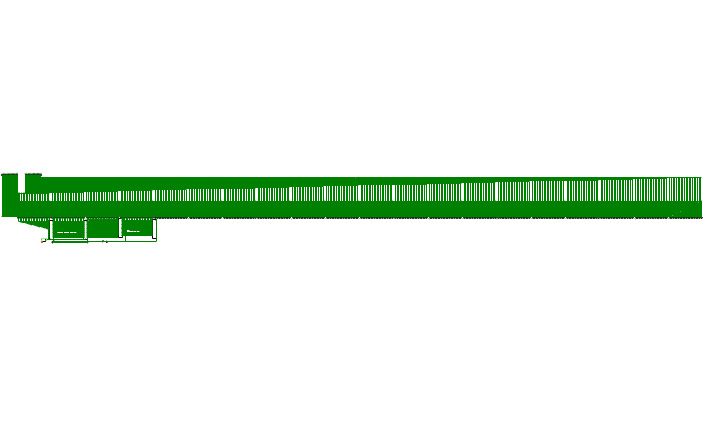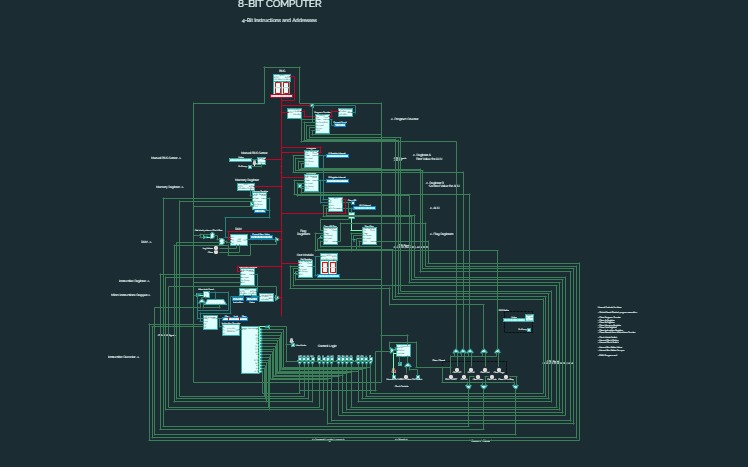A 20bit processor
Done:
In progress:
-Alu
Yet to be done:
-Ram
-Ram address decode logic (Internal, External)
-Interrupts
-Registers
-Resets
-Instruction decode logic
-Transfer hub
-Other stuff
.
.
.
Instruction information:
.
Memory layout:
00000-9ffff: App rom
a0000-ff86e: GP ram
ff86f-ff999: Video ram
ffa00-ffeff: The stack
Notes:
Uses empty stack convention
Uses ascending stack convention
Parameters should be pushed onto the stack before calling the function
Status register goes as following (MSB first): OW, Z, N, E, IntterruptProgress (4bit), ResetProgress (4bit), InterruptAvailable, ResetAvailable, 0b000000
Every mention of "address" refers to the 6-nibble value with address configuration concatenated before the actual memory reference/data
ra1/ra2/ra3 refers to a register or address. The number is to distinguish between different arguments for instructions.
Registers:
Stack Pointer
Instruction
Address
SUM
Status
Instruction step
A
B
Register ids:
Stack Pointer: 0
Instruction: <INTERNAL>
Address: <INTERNAL>
SUM: 1
Status: 2
Instruction step: <INTERNAL>
A: 3
B: 4
fpA: 8
fpB: 9
fpC: a
fpD: b
fpS: c
-Address configuration is concatenated after reg id. Immeadiates and stack pointer indexes are not supported. e.g. 71 is data at B register, 32 is using SUM register as a xxxxx to use $?xxxxx on it.
-fpA through fpD &fpS are floating point registers. Bit functionality is as follows (MSB first): S, EXP (6bit), MAN (13 bit). To calculate the value: (1 + (1-(1/MAN))) * 2^(EXP - 63). -fpA-fpD & fps are incompatible with iadd/isub/idiv/imul/iinc/idec. fpadd/fpfpsub/fpmul/fpdiv/fpinc/fpdec work only on fp registers. They add the actual values, not bits.
-bor/band/bxor do operations on bits, not fpti values, still store binary result in S register.
Register addresses:
Memory page 0: fff00
Memory page 1: fff01
Memory page 2: fff02
Memory page 3: fff03
Address configuration:
-When using on registers, 0x8 as added onto the config
Immeadiate: $#xxxxx (0xxxxx) (Uses data xxxxx)
Address: $@xxxxx (1xxxxx) (Uses data at address xxxxx)
Pointer: $?xxxxx (2xxxxx) (Uses data at address xxxxx and uses $@***** on it)
Stack pointer index: $-xxxxx(%sp) (3xxxxx) (Subtracts xxxxx from stack pointer and uses $?***** on it)
.
.INSTRUCTIONS:
.
mov ra1, ra2:
Stores ra1 into ra2 address (000(ra1)(ra2))
fpti ra1, ra2:
Transfers data at ra1 to ra2 (not bits, value. kinda like "(int) float" in c) (ra1 is encoded in floating point. requires ra1 to be using a fpr or fp address) (001(ra1)(ra2))
itfp (r, fpR), ($Xxxxxx, fpR):
Transfers data at ra1 to ra2 (not bits, value. kinda like "(float) int" in c) (ra1 is encoded in floating point. requires ra2 to be using a fpr or fp address) (002(ra1)(ra2))
bor (ra1,ra2), (ra1, ra2, ra3):
Ors ra1 and ra2 registers, stores result in S register. Updates OW, Z, and N flags in status register (003(r1ID)(r2ID))
Ors ra1 and ra2 registers, stores result in ra3. Updates OW, Z, and N flags in status register (004(r1ID)(r2ID)(r3))
band (ra1, ra2), (ra1, ra2, ra3):
Ands ra1 and ra2, stores result in S register. Updates OW, Z, and N flags in status register (005(r1ID)(r2ID))
Ands ra1 and ra2, stores result in ra3 register. Updates OW, Z and N flags in status register (006(r1ID)$Xxxxxx)
bxor (,r1,r2), (,r1,$Xxxxxx), ($Xxxxxx,r2), ($Xxxxxx,$Yyyyyy):
Xors ra1 and ra2, stores result in S register. Updates OW, Z, and N flags in status register (007(r1ID)(r2ID))
Xors ra1 and ra2, stores result in ra3 register. Updates OW, Z and N flags in status register (008(r1ID)$Xxxxxx)
iadd (,r1,r2), (,r1,$Xxxxxx), ($Xxxxxx,r2), ($Xxxxxx,$Yyyyyy):
Adds r1 and r2 registers, stores result in S register. Updates OW, Z, and N flags in status register (013(r1ID)(r2ID))
Adds r1 register and $xxxxx address, stores result in S register. Updates OW, Z and N flags in status register (014(r1ID)$Xxxxxx)
Adds $xxxxx address and r2 register, stores result in S register. Updates OW, Z and N flags in status register (015$Xxxxxx(r2ID))
Adds $xxxxx and $yyyyy addresses, stores result in S register. Updates OW, Z and N flags in status register (016$XxxxxxYyyyyy)
isub (,r1,r2), (,r1,$Xxxxxx), ($Xxxxxx,r2), ($Xxxxxx,$Yyyyyy):
Subtracts r2 from r1, stores result in S register. Updates OW, Z and N flags in status register (017(r1ID)(r2ID))
Subtracts $xxxxx from r1, stores result in S register. Updates OW, Z and N flags in status register (018(r1ID)$Xxxxxx)
Subtracts r2 from $xxxxx, stores result in S register. Updates OW, Z and N flags in status register (019$Xxxxxx(r2ID))
Subtracts $yyyyy from $xxxxx, stores result in S register. Updates OW, Z and N flags in status register (01a$XxxxxxYyyyyy)
imul (,r1,r2), (,r1,$Xxxxxx), ($Xxxxxx,r2), ($Xxxxxx,$Yyyyyy):
Multiplyes r1 and r2 registers, stores result in S register. Updates OW, Z and N flags in status register (01b(r1ID)(r2ID))
Multiplyes r1 register and $xxxxx address, stores result in S register. Updates OW, Z and N flags in status register (01c(r1ID)$Xxxxxx)
Multiplyes $xxxxx address and r2 register, stores result in S register. Updates OW, Z and N flags in status register (01d$Xxxxxx(r2ID))
Multiplyes $xxxxx and $yyyyy addresses, stores result in S register. Updates OW, Z and N flags in status register (01e$XxxxxxYyyyyy)
idiv (,r1,r2), (,r1,$Xxxxxx), ($Xxxxxx,r2), ($Xxxxxx,$Yyyyyy):
Divides r1 by r2, stores result in S register. Updates E, Z and N flags in status register (01f(r1ID)(r2ID))
Divides r1 by $xxxxx, stores result in S register. Updates E, Z and N flags in status register (020(r1ID)$Xxxxxx)
Divides $xxxxx by r2, stores result in S register. Updates E, Z and N flags in status register (021$Xxxxxx(r2ID))
Divides $xxxxx by $yyyyy, stores result in S register. Updates E, Z and N flags in status register (022$XxxxxxYyyyyy)
iinc $Xxxxxx, r:
Increments address xxxxx (023$Xxxxxx)
Increments register r (024(rID))
idec $Xxxxxx, r:
Decrements address XXXXX (025Xxxxxx)
Decrements register r (026(rID))
fpadd r1,r2:
Adds r1 and r2 registers, stores result in fpS register. Updates OW, Z, and N flags in status register (027(r1ID)(r2ID))
fpsub r1,r2:
Subtracts r2 from r1, stores result in fpS register. Updates OW, Z and N flags in status register (028(r1ID)(r2ID))
fpmul r1,r2:
Multiplyes r1 and r2 registers, stores result in fpS register. Updates OW, Z and N flags in status register (029(r1ID)(r2ID))
fpdiv r1,r2:
Divides r1 by r2, stores result in fpS register. Updates E, Z and N flags in status register (02a(r1ID)(r2ID))
fpinc r:
Increments register r (02b(rID))
fpdec r:
Decrements register r (02c(rID))
phb $Xxxxxx, r:
Increments stack register and sets $-00000(%sp) to $xxxxx (02d)
Increments stack register and sets $-00000(%sp) to r register (02e)
plb $Xxxxxx, r:
Decrements stack register and sets $xxxxx register to $-00000(%sp) (02f)
Decrements stack register and sets r register to $-00000(%sp) (030)
jmp $Xxxxxx, r:
Jumps to $xxxxx address(031Xxxxxx)
Jumps to r register (032(rID))
jow $Xxxxxx, r:
Jumps to $xxxxx address if OW bit is set (033Xxxxxx)
Jumps to r register if OW bit is set (034(rID))
jnow $Xxxxxx, r:
Jumps to $xxxxx address if OW bit is clear (035Xxxxxx)
Jumps to r register if OW is clear (036(rID))
jz $Xxxxxx, r:
Jumps to $xxxxx address if Z bit is set (037Xxxxxx)
Jumps to r register if Z bit is set (038(rID))
jnz $Xxxxxx, r:
Jumps to $xxxxx address if Z bit is clear (039Xxxxxx)
Jumps to r register if Z bit is clear(03a(rID))
jn $Xxxxxx, r:
Jumps to $xxxxx address if N bit is set (03bXxxxxx)
Jumps to r register if N bit is set (03c(rID))
jnn $Xxxxxx, r:
Jumps to $xxxxx address if N bit is clear (03dXxxxxx)
Jumps to r register if N bit is clear(03e(rID))
je $Xxxxxx, r:
Jumps to $xxxxx address if E bit is set (03fXxxxxx)
Jumps to r register if E bit is set(040(rID))
jne $Xxxxxx, r:
Jumps to $xxxxx address if E bit is clear (041Xxxxxx)
Jumps to r register if E bit is clear(042(rID))
8-Bit Computer with Complex Lanes
8-Bit Computer with Complex LanesFollowed the instruction of the 8-Bit Computer YouTube video series by Ben Eater. I also extended it's functionalities a little bit by upgrading from 16 bytes to 256 bytes of RAM and I added a Micro Step Counter Reset (SCR) instruction signal to allow operations to finish earlier.









